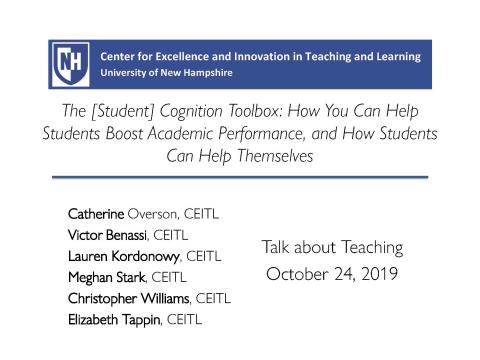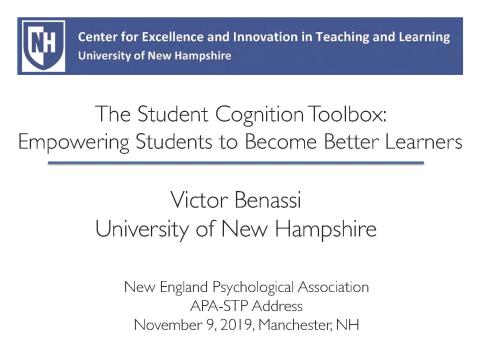The Student Cognition Toolbox: Teaching Students Study Skills Informed by the Science of Learning
The University of New Hampshire’s Center for Excellence and Innovation in Teaching and Learning (CEITL) proposes to develop, implement, and assess the impact of a Student Cognition Toolbox (SCT) that will be an open educational resource (OER). Many students enter college with limited and ineffective study skills. In this project CEITL will develop a comprehensive set of online instructional materials that will teach students cognitively-supported effective and efficient study strategies. A distinctive feature of our learning modules is that each lesson will include a practice component that will assist students in mastery of that strategy. CEITL will then conduct a number of assessments that examine whether and how students use their newly-acquired skills, as well as the impact of their use on academic performance. The grant will include a strong dissemination component involving colleges and universities throughout the New England states. By the end of the grant, SCT modules will be available to all through the world wide web as an OER.
Proposed Project Description: Our proposed project builds on the work we have done over the past decade and will, we believe, take it to a new level of significance and impact in higher education in New England and beyond.
Students enter college with a variety of past experiences and beliefs about how to prepare for assessments of their academic performance (e.g., exams, problem solving, performance skills). An ongoing study of nearly 6,000 high school seniors’ approaches to study documents that students’ preferred study strategy involves mainly reading and re-reading material (notes, texts, handouts, etc.) (Butler, 2018, Washington University, St. Louis). More striking, a majority of students reported using only one approach to study. Considerable research supports that most students routinely prefer and use study strategies that are ineffective relative to strategies supported by applied research on cognition. In addition, this research shows that different study strategies are needed for different kinds of learning—one size does not fit all. Perhaps most concerning is that less able students are especially prone to using study strategies that are relatively ineffective and inefficient.
In all of our prior initiatives, the focus was on working with course teachers to apply instructional principles designed to improve student learning outcomes. We worked with them to design, implement, and assess the impact of instructional interventions which required students to complete out-of-class and/or in-class activities that incorporated the cognitively-supported principles that we know to positively affect student learning. This approach was highly successful; we documented consistent and often substantial gains in student learning, retention, and transfer of learning. However, regardless of our dissemination efforts, we cannot reach all teachers to assist them in planning and deploying strong instructional interventions.
With our new initiative, we have shifted our focus directly on students. Our overarching goal is to instruct students on the use of the most effective study techniques. We will develop, implement, and assess the impact of a set of cognitively-based study strategies that will help students to both learn and use in their academic coursework. We propose that students who learn how to use these techniques, and who in fact do use them in their academic courses, will reap substantial academic benefits. These benefits will include improved performance in their courses, increased levels of academic self-efficacy, and greater persistence in academic programs. Based on our prior work, we expect that these benefits will be especially impactful among those students who enter the university with relatively less able academic profiles.
The Student Cognition Toolbox (SCT) Webinars
The Student Cognition Toolbox: Tour and Implementation
Presenters: Dr. Catherine Overson and Dr. Victor Benassi
Open Learning Initiative (OLI) Webinar
Carnegie Mellon University
October 29, 2020
YouTube: 1 hour, 14 min.
Research on The Student Cognition Toolbox: Establishing the Validity of an Instructional Tool(box)
The Simon Initiative
Carnegie Mellon University
October 16, 2020
YouTube: 1 hour, 18 min.
The Student Cognition Toolbox: Empowering Students to Become Better Learners
The Simon Initiative
Carnegie Mellon University
October 15, 2020
YouTube: 1 hour, 58 min.
Presentations

Synapsis: Cognitively-based study strategies promote student learning in academic courses, but many students are unaware that some strategies produce better learning outcomes than others; moreover, students often use strategies that can hinder their learning. In the fall of 2019, CEITL launched the Student Cognition Toolbox (SCT); a set of online instructional materials that teaches students cognitively-supported effective and efficient study strategies. A distinctive feature of the SCT is that lessons will include a practice component that will assist students in mastery of that strategy. Our modules cover a wide-range of study strategies, for example: elaborative interrogation, self-explanation, retrieval practice (practice quizzing), worked examples, spacing and interleaving of practice.
In this workshop, we described and demonstrated the SCT, which, delivered through the Carnegie Mellon University Open Learning Initiative platform, can be accessed through Canvas. This session demonstrated how you can incorporate the SCT into your courses, and how the SCT will teach students study skills that are appropriate for your learning outcomes.

Synapsis: Professor Benassi and his colleagues have spent over a decade working with course instructors to design, implement, and assess the impact of instructional principles informed by the science of learning. The take home message from this work is that, under a variety of conditions and in a variety of courses, they have documented boosts in students’ academic performance. They have monitored which interventions have the most robust effects as well as boundary conditions. To date, the focus of this work has been on helping instructors to implement assignments that are designed to promote student learning. Generally (with consideration of boundary conditions), if students complete the assignments, on average, they reap the benefits on high stakes exams. In this presentation, Professor Benassi discusses the next step in this work: instructing students directly on how to use powerful study techniques informed by the science of learning—for example, retrieval practice, spacing of study, interleaving of practice, self-explanation. He described the Student Cognition Toolbox (SCT) and demonstrated its use either as a standalone open educational resource or as an embedded component within an academic course. He also shared results on the efficacy of the SCT.
If you are interested in incorporating the Student Cognition Toolbox into your course, or would like more information, please contact teaching.excellence@unh.edu.
Davis Educational Foundation
The Student Cognition Toolbox is made possible by a grant from the Davis Educational Foundation (Yarmouth, Maine). The Foundation was established by Stanton and Elisabeth Davis after Mr. Davis's retirement as chairman of Shaw's Supermarkets, Inc.